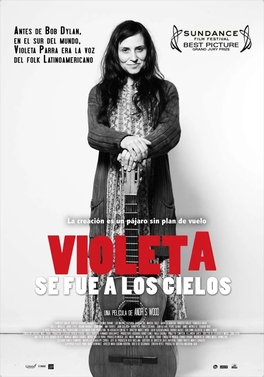Violeta se fue a los cielos
| Violeta Went to Heaven | |
|---|---|

Theatrical release poster
|
|
| Directed by | Andrés Wood |
| Produced by | Patricio Pereira |
| Screenplay by | Eliseo Altunaga |
| Based on |
Violeta se fue a los cielos by Ángel Parra |
| Starring |
|
| Cinematography | Miguel Abal Miguel Ioann Littin Menz |
| Edited by |
|
|
Release date
|
|
|
Running time
|
110 minutes |
| Country | Chile |
| Language | Spanish |
Violeta Went to Heaven (Spanish: Violeta se fue a los cielos) is a 2011 Chilean biopic about singer and folklorist Violeta Parra, directed by Andrés Wood. The film is based on a biography by Ángel Parra, Violeta's son with Luis Cereceda Arenas. He collaborated on the film.
The film was selected as the Chilean entry for the Best Foreign Language Film at the 84th Academy Awards, but it did not make the final shortlist. It was awarded the World Cinema Jury Prize (Dramatic) at the 2012 Sundance Film Festival.
The film was released on 11 August in Chile in 17 cinemas. About 6,000 people saw the film on the day of its release. There were not very many copies, so the film was not shown in major cities such as Chillán. After its box office success and an outcry by the press, it was shown more widely. It was released on 27 October in Argentina. The film was seen 391,465 times in 2011, making it the most watched Chilean film of 2011. The following year it was released at the Sundance Film Festival in the United States and later premiered in New York City at the Latinbeat film series held by The Film Society of Lincoln Center. Later in 2012, it was released in Brazil, the Netherlands, France, Peru Germany, Sweden, and Belgium. It appeared at a variety of festivals including Paris Cinéma, Biarritz International Festival of Latin American Cinema, Hamburg Film Festival, and the .
The film depicts Violeta del Carmen Parra Sandoval’s road to becoming considered one of Chile’s greatest folklorists and artists. It chronicles her guitar playing at a very young age, the ambience of her musician father’s haunts, and the rural settings of southern Chile in the Ñuble Province.
The film follows Parra in her project of studying Chilean folk music in order to preserve and carry forward in an original way traditional composition styles to form the genre now known as Nueva Canción Chilena (English: New Chilean music). It shows her seeking out old musicians and asking them to sing or strum the songs they knew.
...
Wikipedia
